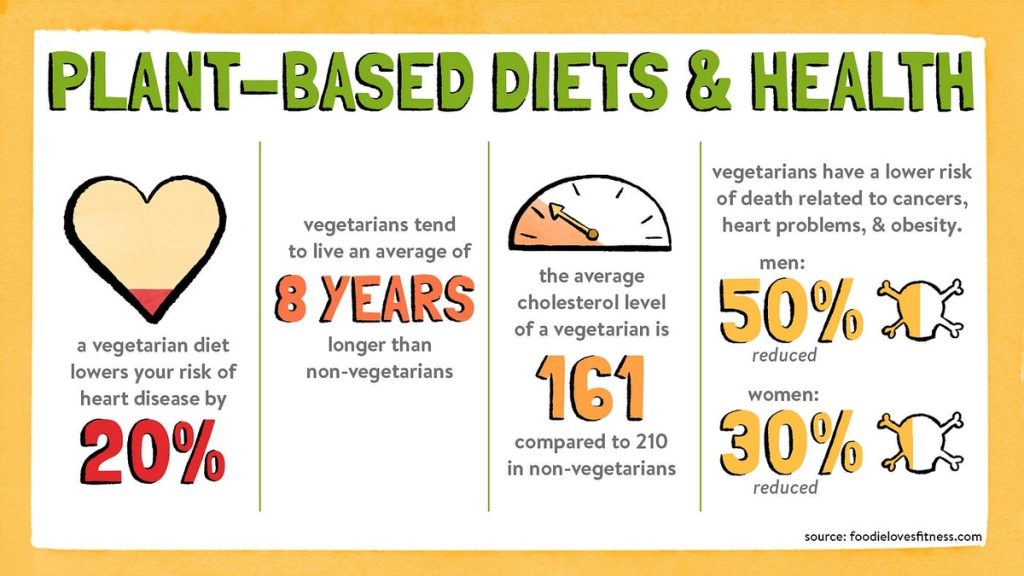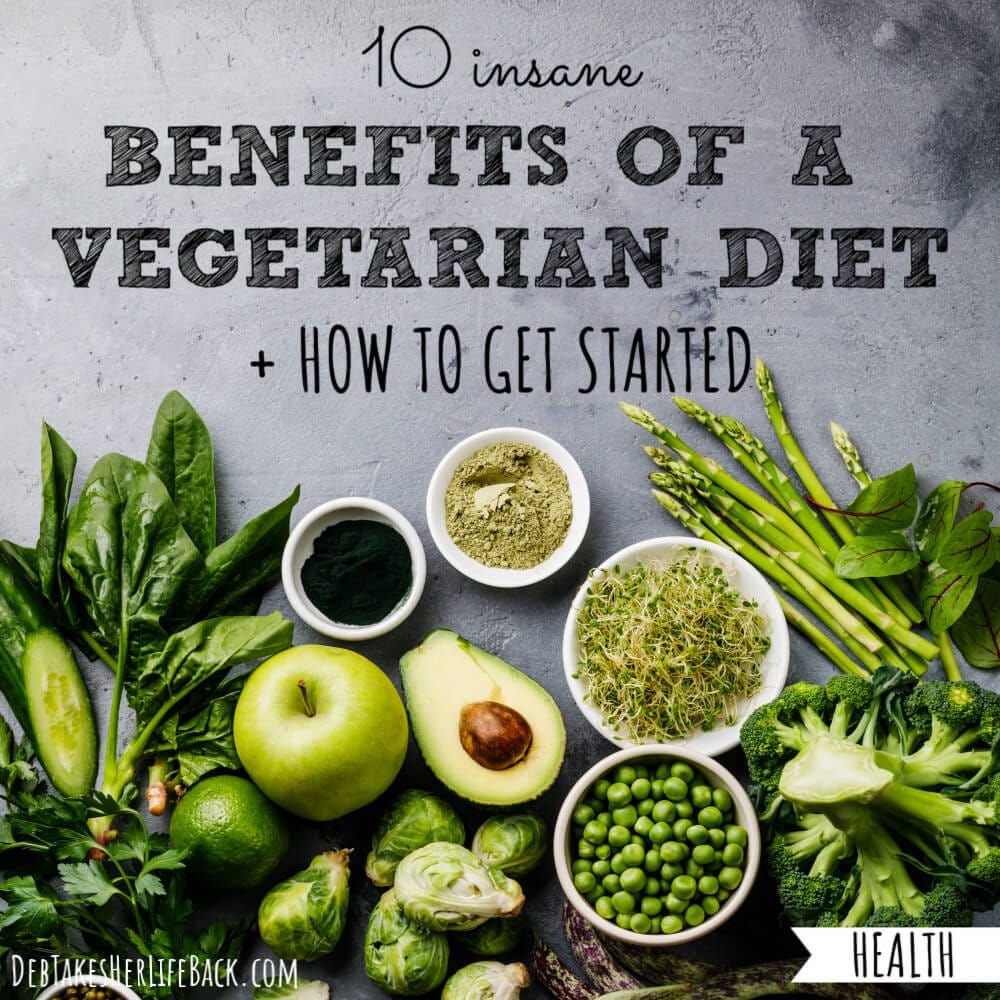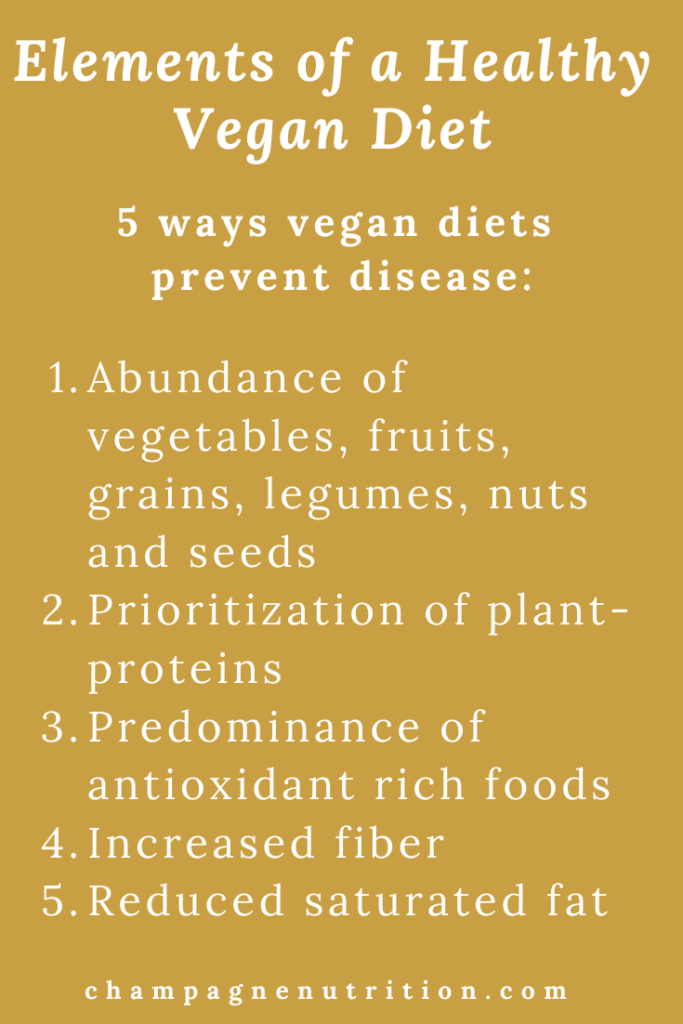Are you curious about the health benefits of vegetarian diets? Look no further! In this article, we will uncover the numerous advantages that come with adopting a vegetarian lifestyle. From reducing the risk of many chronic diseases to promoting weight loss and improved digestion, vegetarian diets offer a plethora of benefits for both your body and mind. In addition to exploring these benefits, we will also provide some helpful tips on how to ensure you are getting all the necessary nutrients from your plant-based diet. So, whether you’re a seasoned vegetarian or considering making the switch, get ready to discover the amazing advantages of vegetarian diets and learn how to make the most out of your meatless meals.
The Basics of Vegetarian Diets
What is a vegetarian diet?
A vegetarian diet is a dietary pattern that excludes the consumption of meat, poultry, and seafood. However, it does include an abundance of plant-based foods, such as fruits, vegetables, whole grains, legumes, nuts, and seeds. Some vegetarians also consume dairy products and eggs, while others may avoid these as well. The focus of a vegetarian diet is on plant-based nutrition and the exclusion of animal products.
Types of vegetarian diets
There are several different types of vegetarian diets, each with its own level of restrictiveness. The most common types are:
-
Lacto-ovo vegetarian: This diet includes plant-based foods, dairy products, and eggs but excludes meat, poultry, and seafood.
-
Lacto-vegetarian: This diet includes plant-based foods and dairy products but excludes eggs, meat, poultry, and seafood.
-
Ovo-vegetarian: This diet includes plant-based foods and eggs but excludes dairy products, meat, poultry, and seafood.
-
Vegan: This diet excludes all animal products, including meat, poultry, seafood, dairy products, eggs, and even honey.
It is important to choose a vegetarian diet that suits your personal preferences and nutritional needs.
Lower Risk of Chronic Diseases
Reduced risk of heart disease
Following a vegetarian diet has been associated with a lower risk of heart disease. Plant-based foods are generally low in saturated fats and cholesterol, both of which are known to contribute to heart disease. Additionally, vegetarian diets are typically high in fiber, antioxidants, and phytochemicals, all of which have been shown to have protective effects on heart health.
Lower incidence of cancer
Studies have shown that individuals who follow a vegetarian diet have a lower incidence of certain types of cancer, including colorectal, breast, and prostate cancer. The high fiber content and abundance of antioxidants in plant-based foods are believed to play a role in reducing the risk of cancer development.
Lower risk of diabetes
Vegetarian diets have been found to lower the risk of developing type 2 diabetes. The exclusion of animal products helps to reduce the intake of saturated fats and excessive calories, which are risk factors for diabetes. Additionally, the high fiber content and complex carbohydrates found in plant-based foods help to regulate blood sugar levels.
Decreased risk of hypertension
Hypertension, or high blood pressure, is a common health concern, but following a vegetarian diet can help lower the risk. Plant-based diets tend to be low in sodium and high in potassium, which promotes healthy blood pressure levels. Additionally, the abundance of nutrients in plant-based foods supports overall cardiovascular health and reduces the risk of hypertension.

Weight Management
Aiding weight loss
One of the benefits of a vegetarian diet is its potential for aiding weight loss. Plant-based foods tend to be lower in calories and saturated fats compared to animal products. Additionally, the high fiber content and water content in fruits and vegetables can help you feel full and satisfied, reducing the likelihood of overeating.
Maintaining a healthy weight
If weight loss is not a goal, a vegetarian diet can still support maintaining a healthy weight. By focusing on plant-based foods, you can ensure a nutrient-dense and balanced diet. This means you can consume an appropriate number of calories while still obtaining all the necessary vitamins, minerals, and other essential nutrients.
Improved Digestive Health
Enhanced gut health
A vegetarian diet rich in fruits, vegetables, whole grains, and legumes provides a wide range of dietary fiber, which is essential for maintaining a healthy digestive system. Fiber helps to promote regular bowel movements, supports the growth of beneficial gut bacteria, and aids in the prevention of digestive issues such as constipation and diverticulosis.
Reduced risk of constipation
Due to the high fiber content in plant-based foods, individuals following a vegetarian diet are at a lower risk of experiencing constipation. Fiber adds bulk to the stool, promotes healthy bowel movements, and helps prevent the uncomfortable and often painful condition of constipation.
Improved bowel movement
A diet centered around plant-based foods ensures an adequate intake of fiber, which can improve bowel movements. Regular and healthy bowel movements are important for overall digestive health, as they help to eliminate waste products from the body and prevent the buildup of toxins.

Nutritional Advantages
High intake of vitamins and minerals
Vegetarian diets, when well-planned, can provide a high intake of essential vitamins and minerals. Fruits, vegetables, whole grains, legumes, nuts, and seeds are rich sources of a wide variety of nutrients including vitamin C, vitamin A, vitamin K, folate, magnesium, and potassium, to name a few. These nutrients are vital for the proper functioning of the body and supporting overall health.
Increased fiber consumption
As mentioned earlier, vegetarian diets are typically high in dietary fiber. This is beneficial for digestive health, weight management, and the prevention of chronic diseases. Fiber adds bulk to the diet, aids in regular bowel movements, and helps you feel fuller for longer, reducing the likelihood of overeating.
Quality source of antioxidants
Antioxidants are substances that help protect the body from damage caused by harmful molecules called free radicals. Plant-based foods are rich in antioxidants such as vitamins C and E, beta-carotene, and various phytochemicals. By consuming a vegetarian diet, you ensure a quality source of antioxidants, which can help reduce the risk of chronic diseases and support overall well-being.
Lower intake of saturated fat
Animal products, such as meat and dairy, are typically high in saturated fats. By following a vegetarian diet that excludes these foods, you automatically reduce your intake of saturated fats. This is important for heart health, as high levels of saturated fats are associated with an increased risk of heart disease.
Reduced cholesterol levels
Consuming a diet low in cholesterol is beneficial for lowering cholesterol levels and reducing the risk of heart disease. Since vegetarian diets are generally cholesterol-free, they can help maintain healthy cholesterol levels. Additionally, plant-based foods contain phytosterols, which can help lower cholesterol absorption in the body.
Protection Against Certain Conditions
Reduced risk of gallstones
Gallstones are hardened deposits that form in the gallbladder and can cause severe pain and discomfort. By following a vegetarian diet, which is typically low in saturated fats and cholesterol, you can reduce the risk of gallstone formation. Plant-based diets emphasize healthy fats from sources such as nuts, seeds, and olive oil, which can help promote overall gallbladder health.
Lower likelihood of kidney stones
Kidney stones are solid deposits of minerals and salts that form in the kidneys. Vegetarian diets, especially those high in fruits and vegetables, are associated with a lower risk of kidney stone formation. This is because plant-based foods are generally alkaline, which helps to prevent the formation of certain types of kidney stones.
Decreased chances of osteoporosis
Osteoporosis is a condition characterized by weak and brittle bones. Vegetarian diets, when well-planned, can provide adequate amounts of calcium, vitamin D, magnesium, and other nutrients necessary for maintaining strong bones. The higher intake of fruits, vegetables, and legumes in vegetarian diets also helps to maintain a favorable acid-base balance, which is important for optimal bone health.

Beneficial for Pregnancy and Infants
Positive impact on maternal health
A vegetarian diet can be a healthy choice for pregnant women, as it provides the necessary nutrients for both the mother and the developing baby. It is important, however, to ensure adequate intake of nutrients such as iron, vitamin B12, omega-3 fatty acids, and protein through plant-based sources or appropriate supplementation. Consultation with a healthcare provider or a registered dietitian is recommended during pregnancy to ensure optimal nutrition.
Health advantages for newborns and infants
When a vegetarian diet is followed in a well-planned manner, it can provide adequate nutrition for newborns and infants. Breast milk from a vegetarian mother is typically nutrient-rich and provides all the necessary nutrients for a growing baby. For vegetarian babies, a variety of plant-based foods can be introduced gradually to ensure a balanced intake of essential nutrients.
Mental Well-being
Improved mood and well-being
Following a vegetarian diet has been linked to improved mood and overall mental well-being. The consumption of fruits, vegetables, whole grains, and legumes, which are rich in vitamins, minerals, and antioxidants, supports brain health and the production of feel-good neurotransmitters. Additionally, the exclusion of certain animal products and the ethical considerations associated with vegetarianism may contribute to a more positive state of mind.
Lower risk of depression and anxiety
Research suggests that vegetarian diets may be associated with a lower risk of depression and anxiety. A diet rich in plant-based foods provides a variety of nutrients that are essential for optimal brain function and mental health. Additionally, the high fiber content and lack of processed foods in vegetarian diets may contribute to a healthier gut microbiome, which has been linked to improved mental well-being.

Environmental Sustainability
Reduced carbon footprint
The production and consumption of meat and animal products have a significant impact on greenhouse gas emissions and contribute to climate change. By adopting a vegetarian diet, you can significantly reduce your carbon footprint. Plant-based foods require fewer resources, such as land, water, and energy, to produce, making them a more sustainable choice for the environment.
Preservation of natural resources
In addition to reducing carbon emissions, following a vegetarian diet helps preserve natural resources. Animal agriculture requires large amounts of land, water, and feed, leading to deforestation, increased water usage, and habitat destruction. By choosing plant-based alternatives, you contribute to the conservation of natural resources and promote environmental sustainability.
Potential Challenges and Nutritional Considerations
Ensuring adequate protein intake
One of the main concerns associated with vegetarian diets is ensuring an adequate intake of protein. While animal products are a complete source of protein, plant-based foods can also provide all the essential amino acids when consumed in combination. Including a variety of protein-rich plant foods such as legumes, tofu, tempeh, seitan, quinoa, and nuts in your diet can help meet your protein needs.
Monitoring levels of key nutrients
Vegetarian diets, especially strict vegan diets, may require careful monitoring of certain nutrients to ensure adequacy. Nutrients that require attention include vitamin B12, iron, calcium, omega-3 fatty acids, and vitamin D. These can be obtained through fortified foods, supplements, or careful meal planning. Regular blood tests and consultations with a healthcare provider or registered dietitian can help assess and optimize nutrient status.
The importance of meal planning
To ensure a well-balanced and nutritious vegetarian diet, proper meal planning is essential. This involves selecting a variety of plant-based foods from different food groups, including fruits, vegetables, whole grains, legumes, nuts, and seeds. Planning meals in advance can help ensure you meet your nutritional needs and avoid any potential deficiencies.
In conclusion, adopting a vegetarian diet can offer numerous health benefits, including a reduced risk of chronic diseases, weight management support, improved digestive health, and a lower likelihood of certain conditions. Additionally, vegetarian diets can be beneficial for pregnancy, infants, and mental well-being. By choosing a vegetarian lifestyle, you not only enhance your personal health but also contribute to environmental sustainability. However, it is important to be mindful of potential challenges and nutritional considerations, such as protein intake, nutrient monitoring, and meal planning. With proper knowledge and guidance, a well-planned vegetarian diet can support your overall health and well-being.


